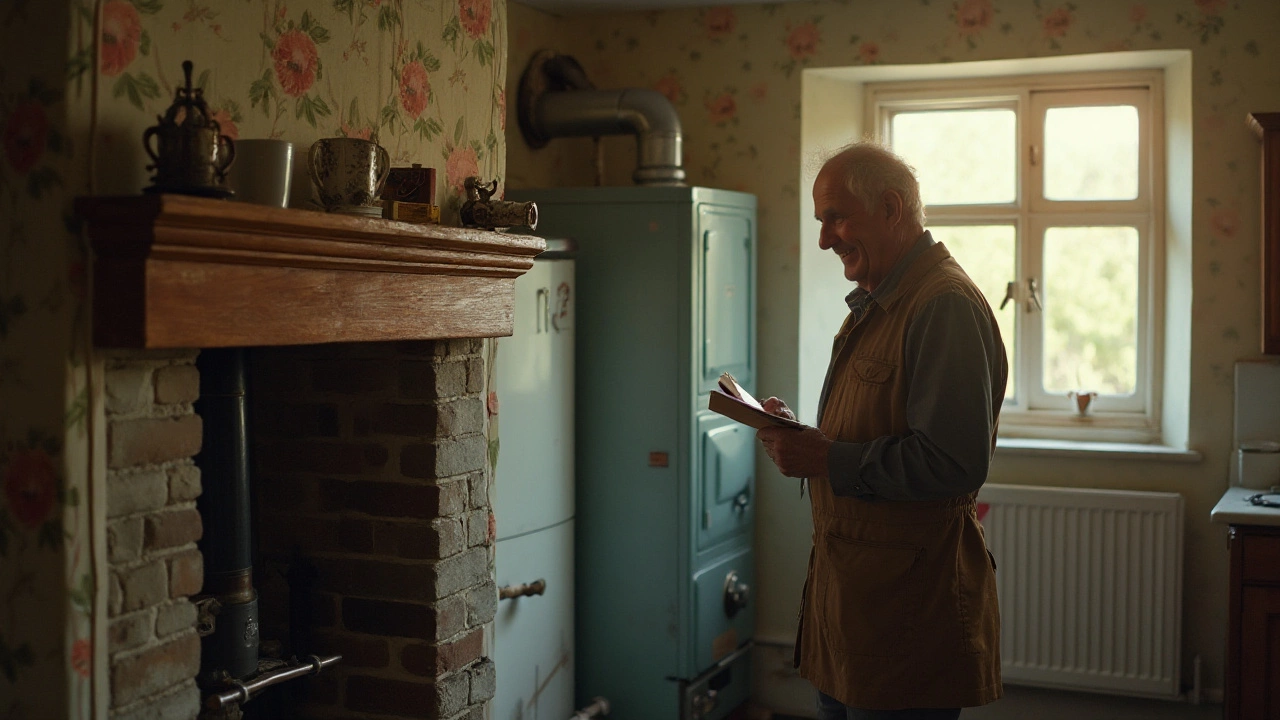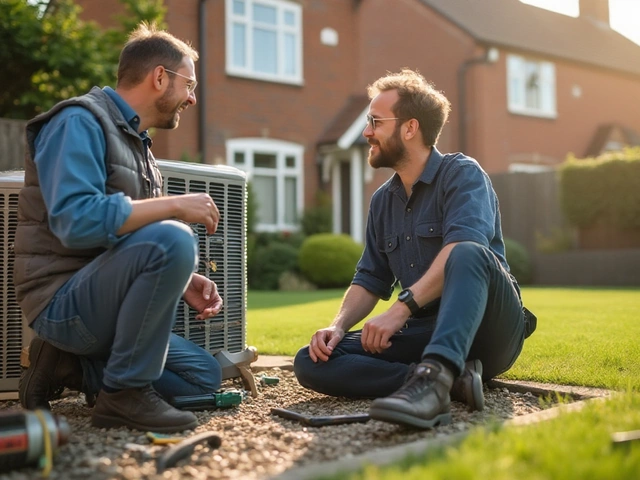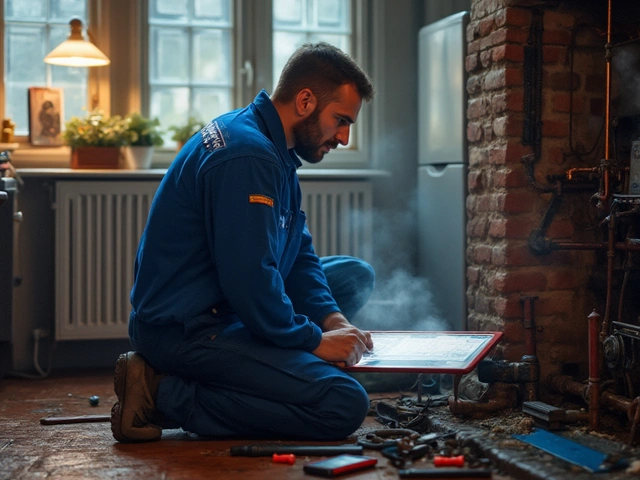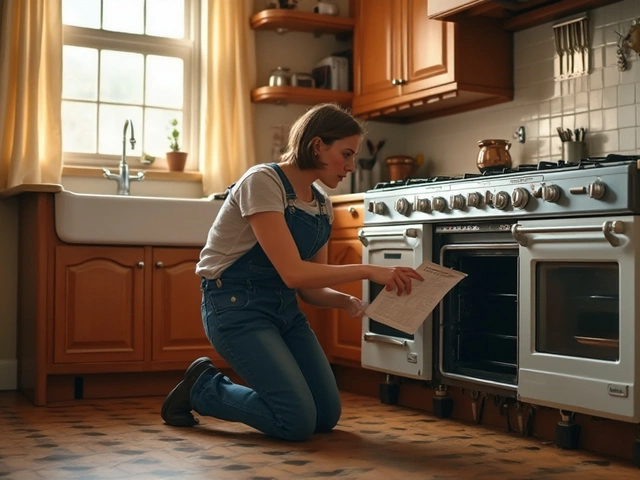Boilers are the heart of a home's heating system, quietly ensuring warmth during the cold months. Yet, like all equipment, they don't last forever. Homeowners often grapple with the tough decision—should you repair an ailing boiler or invest in a new one?
This article delves into the nitty-gritty of deciding when a repair is worthwhile and when a replacement is a smarter investment. By considering factors like repair costs, energy efficiency, and the age of your system, you can make a decision that keeps your home cozy without breaking the bank. Let's explore what you need to know about maintaining or replacing your boiler.
- Signs Your Boiler Needs Repair
- Evaluating Repair Costs vs. Replacement
- Benefits of Regular Boiler Maintenance
- Eco-Friendly Boiling Solutions
Signs Your Boiler Needs Repair
It can be easy to overlook the signs that your boiler is in need of attention, but your heating system often gives ample warnings before it breaks down completely. There are several tell-tale signs to keep an eye on, each pointing to the need for professional boiler repair. One of the most obvious signs is when the boiler is not producing heat or hot water as efficiently as it used to. This can be due to a variety of reasons, such as a failing thermostat, low water pressure, or a broken valve. If your radiator isn't heating up or the hot water in your taps is lukewarm at best, it's time to call in a specialist.
You should also listen for unusual noises emanating from your boiler. Banging noises, gurgling, or even a whistle akin to a kettle boiling might mean air is trapped in the system, or there could be a buildup of lime scale on the heat exchanger. These sounds, especially when frequent, indicate something more than the usual operational whoosh or hum. Many homeowners erroneously dismiss sporadic sounds as harmless until it’s too late. In the UK alone, boiler failure costs households millions yearly because of neglected signs.
Another significant sign includes frequent boiler shut-offs. If your system keeps turning off without any apparent reason, there could be an underlying issue with the thermostat settings or a safety switch that needs adjustment. This is not just an inconvenience; it might be indicative of a more serious problem that could eventually threaten your home's safety. Moreover, the boiler's age is another factor to consider. As boilers near the upper end of their life expectancy, they become less efficient and more prone to breakdowns, signaling a need for repair—if not replacement.
Keep an eye on your home’s energy bills as well. A sudden spike can be a sign your boiler is not functioning at its peak efficiency and has to work harder, thus consuming more energy to provide the same level of heating – a typical sign that repair is needed. According to a survey by Energy Saving Trust, nearly 60% of heating costs in a typical home can be attributed to boiler inefficiencies. As one expert noted in a 2023 HVAC Expo panel,
"Preventative maintenance is always cheaper than emergency repairs. A spike in energy bills is often the financial nudge that gets people to finally check their heating systems."
Lastly, if you notice a yellow flame in the burner instead of a healthy blue one, this is a serious issue indicating incomplete combustion, which could release dangerous carbon monoxide. Such signs should be treated with urgency as they pose significant health risks to the household. Always have a functioning carbon monoxide alarm installed near the boiler to alert you of any irregularities.

Evaluating Repair Costs vs. Replacement
When faced with a malfunctioning boiler, the decision to repair or replace it can be quite challenging. One key factor to consider is the cost-effectiveness of each option. On average, a boiler repair might set you back anywhere from a hundred to a couple of thousand dollars, depending on the problem and the parts required. If your boiler is relatively new and hasn’t had many issues in the past, a repair might be a worthwhile investment. However, if breakdowns are becoming a frequent nuisance, it might just be a sign that a more permanent solution is needed. It's crucial to weigh the potential costs of continuous fixes against a one-time investment in a replacement, especially if your system is old and outdated.
A very interesting point to consider is the efficiency of your current home heating system. Older models tend to be less efficient, resulting in higher energy bills. A modern boiler can significantly reduce these costs. In fact, according to Energy Star, replacing an antiquated system with an energy-efficient model can slash your heating bills by up to 30%. This significant reduction in operating costs over time might justify the upfront expense of a new boiler. Take into account how much you spend on energy each year, and how those savings could offset the cost of a new unit.
Another dimension in this decision-making process is environmental impact. Boilers with improved efficiency are typically more eco-friendly, reducing your carbon footprint. If you replace your current system with an eco-conscious model, not only do you save money, but you also do your part in protecting the environment. Some governments even offer rebates or tax incentives for upgrading to energy-efficient heating systems. Exploring these opportunities might further tip the scales in favor of replacement.
The U.S. Department of Energy suggests, "If your equipment is more than 15 years old, replacing it with a high-efficiency model could easily pay for itself over time in energy savings."
Consider too, the non-monetary factors like comfort and safety. A new boiler with the latest technology could offer better temperature control, ensuring that every corner of your home stays warm and comfortable. Additionally, newer models tend to have advanced safety features that might not be present in older units, providing peace of mind for you and your family. When compounded with the financial aspects, these qualitative factors can make a compelling case.
But how do you make a final decision? Begin with a detailed evaluation of your current system. How long ago was it last serviced? Have you looked into its efficiency ratings? Compare the estimated cost of the repair against quotes for a replacement. Factor in long-term savings and potential rebates. Ultimately, the decision to repair or replace revolves around balancing immediate financial considerations with long-term benefits, comfort, and ecological impact.
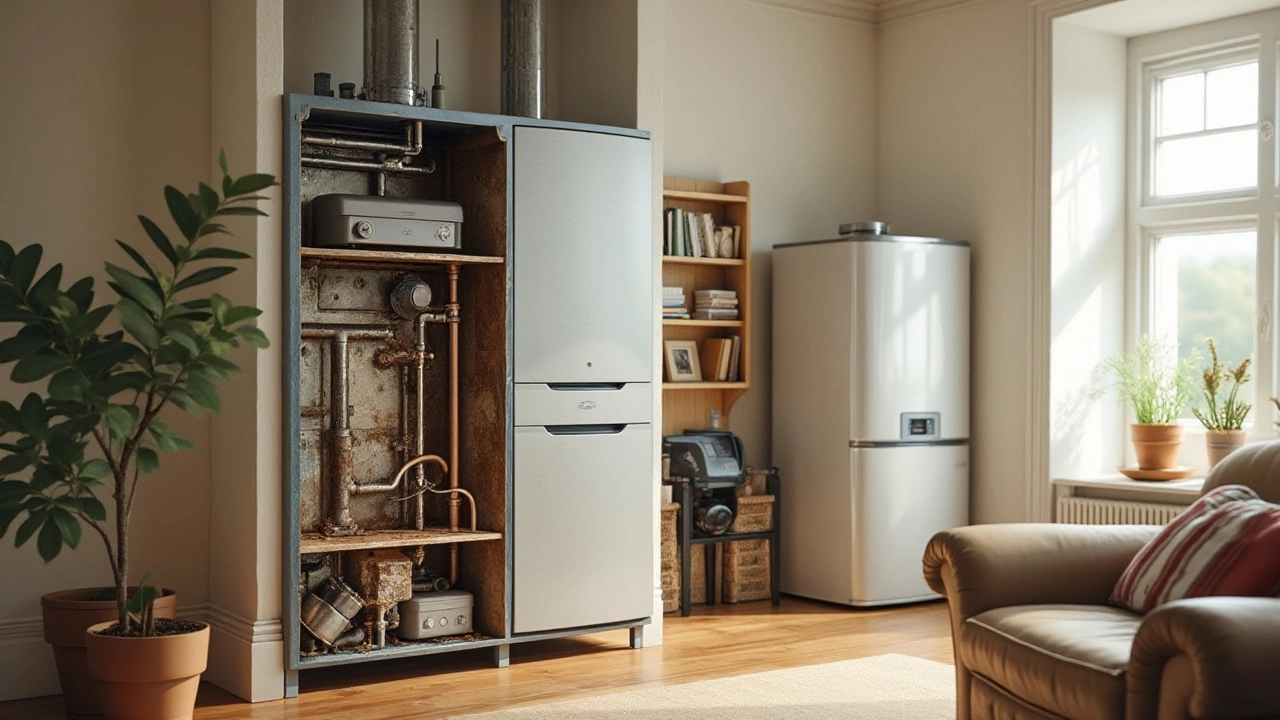
Benefits of Regular Boiler Maintenance
Regular boiler maintenance is something homeowners might overlook, yet it holds significant importance. Like a car engine that needs periodic tuning, boilers require consistent upkeep to function at their best. A well-maintained boiler not only operates more efficiently but also extends the life of the unit, making it a prudent financial decision. In fact, many experts in home heating argue that scheduled maintenance is a small investment compared to the potential cost savings on repairs and energy consumption.
One of the main benefits of consistent boiler upkeep is enhanced safety. A boiler that receives attention regularly is less likely to develop dangerous issues like gas leaks or carbon monoxide emissions. These are silent threats, arising without notice, posing severe risks to household safety. Regular checks help detect and fix minor problems before they escalate into major hazards. A detailed annual inspection by a professional can save you from unforeseen mishaps and offers peace of mind.
Improved Efficiency
Efficiency is another compelling benefit of routine boiler maintenance. Over time, boilers accumulate residues and soot that can impair their performance. A maintenance routine that includes cleaning out the unit and checking its controls ensures it operates at peak efficiency, which can lead to substantial savings on energy bills. Efficient boilers require less fuel to heat the home, resulting in lower utility costs. This improvement is not only good for your wallet but also better for the environment, as reduced fuel usage cuts down on harmful emissions.
An article in the 'Energy Statistics Yearbook' outlines that households that regularly maintain their boilers can save up to 10% on their annual heating costs. Imagine a boiler working tirelessly throughout the winter without losing its ability to keep temperatures consistent and steady. Maintenance secures this assurance, preventing those dreaded breakdowns during freezing nights.
Prolonged Boiler Lifespan
"Good care extends your boiler’s life by as much as 5 years, delaying the hefty investment of a new system," says John Livingston, a respected HVAC specialist.
The lifespan of your boiler significantly increases with regular check-ups. Similar to how routine care prolongs the life of electronic devices or automobiles, boilers benefit from constant oversight. Not only do they face less strain due to accumulated debris, but well-maintained boilers suffer fewer breakdowns, requiring less frequent disruptive repairs. This means that homeowners can enjoy the comfort of reliable heating for years longer than expected.
Moreover, serviced boilers maintain their warranty status, as most manufacturers require evidence of regular maintenance as a condition for warranty claims. Skipping this crucial step could mean higher repair bills on the rare occasion something does go wrong.
| Benefit | Impact |
|---|---|
| Operational Efficiency | Lower energy usage, reduced bills |
| Safety | Prevention of hazardous leaks |
| Lifespan | Extends the durability of the boiler |
In summary, investing time and a minimal cost in regular maintenance yields dividends in efficiency, safety, and longevity of your home heating equipment. As such, it is not just a proactive measure, but a smart one that protects your home, finances, and family warmth through seasons.
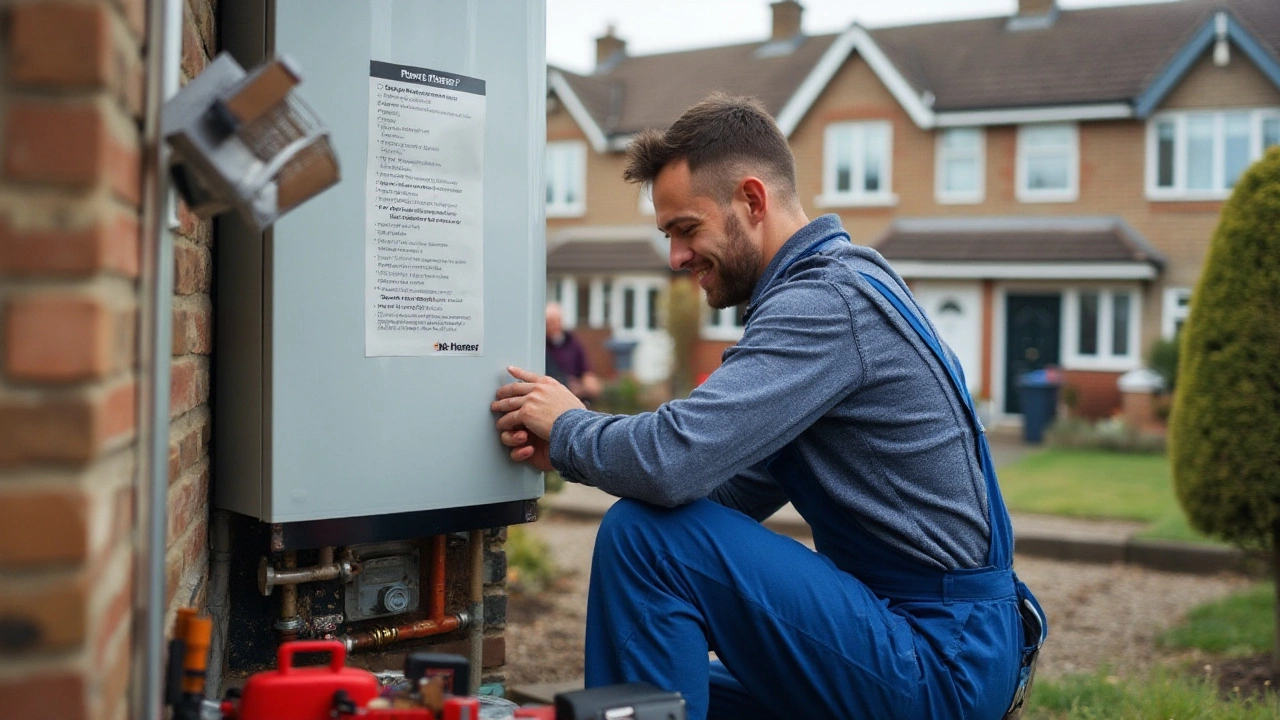
Eco-Friendly Boiling Solutions
As our world becomes increasingly conscious of environmental impact, upgrading to eco-friendly boiling solutions has emerged as a noteworthy trend. Sustainable living encompasses various daily-life choices, including the type of boiler people use in their homes. Modern boilers offer not just energy efficiency but reduce a family's carbon footprint, which is a significant step towards more sustainable living. Did you know that heating accounts for around 60% of a home's yearly energy costs? Opting for an eco-friendly boiler can significantly cut down on these expenses and emissions. The question remains about how one might choose the best alternative in the current market.
High-efficiency condensing boilers are considered a game-changer. Condensing boilers can convert more than 90% of their fuel into heat, losing very little energy in the process. These units are fitted with large heat exchangers that recover more heat and send cooler gases up the flue, reducing the boiler's impact on the environment and providing a neat solution to climbing energy prices. Combating these increases in prices is crucial for the modern home, but just as essential is the reduction of our environmental footprint.
One emerging option is the combi boiler, which combines both central heating and hot water in a single compact appliance. Combi boilers don't require a separate tank for hot water, which not only saves space but also energy as the water is heated directly from the mains when needed. No wonder they have become the choice of many urban households. It becomes a matter of efficiency and convenience combined, supporting a greener household by ensuring energy isn’t spent on heating water that won’t be used immediately.
Delving into the realm of renewable energy, solar-assisted boilers present a fascinating choice. Integrating solar panels with the home heating system, these boilers utilize solar energy to support water heating, thereby slashing dependency on fossil fuels. While this requires an initial investment, the savings over time, both financially and ecologically, make it a promising option, especially in areas with abundant sunlight. A recent study indicated that households adopting solar-assisted systems could reduce their energy bills by up to 60% annually—a remarkable feat that underscores the potential of renewable solutions.
The Energy Saving Trust highlights that replacing an old gas boiler with a new A-rated condensing boiler and improving your heating controls can save you between 20-30% on energy bills.
Technology advancements have yet to plateau, pointing towards emerging innovations like hydrogen boilers, which promise zero carbon emissions when truly harnessed. These are currently under development but hold the potential to revolutionize how homes are heated by using hydrogen gas—a clean fuel alternative. As this avenue unfolds, we can expect a paradigm shift in boiler technology, aligning heating solutions with global sustainability goals.
| Boiler Type | Efficiency | Estimated Savings |
|---|---|---|
| Condensing Boiler | Over 90% | Up to 30% on energy bills |
| Combi Boiler | Energy efficient | Space and energy saving |
| Solar-Assisted Boiler | Depends on solar efficiency | Up to 60% on energy bills |
Incorporating eco-friendly boiling solutions is not just about immediate financial savings—but future-proofing homes, contributing to a balanced ecosystem, and aligning with sustainable living values. Evaluating one's needs and local resources can guide homeowners in selecting the most suitable boiler system, facilitating a positive environmental impact starting from their hearth. It's a march towards a greener future, one eco-friendly boiler at a time.
